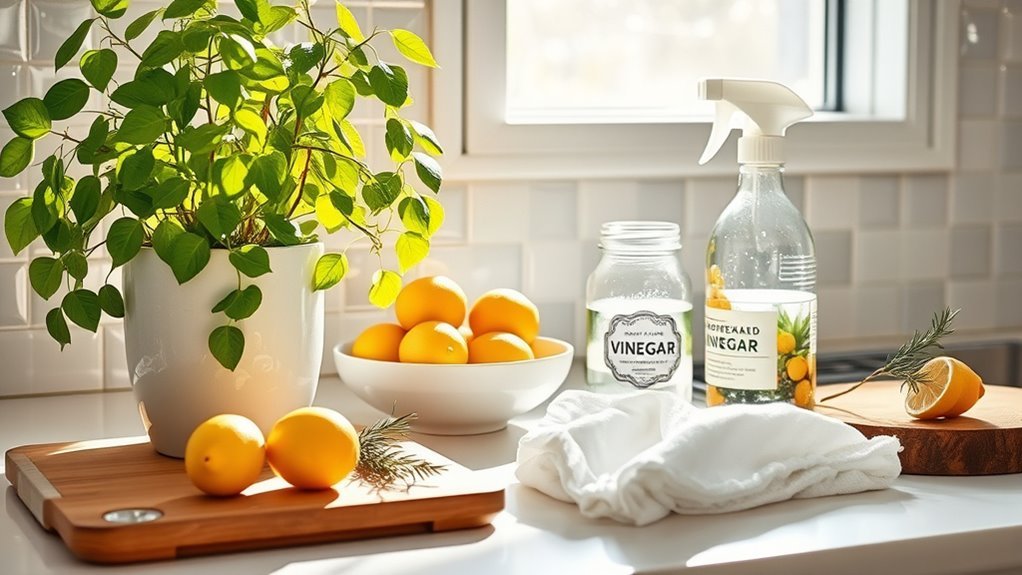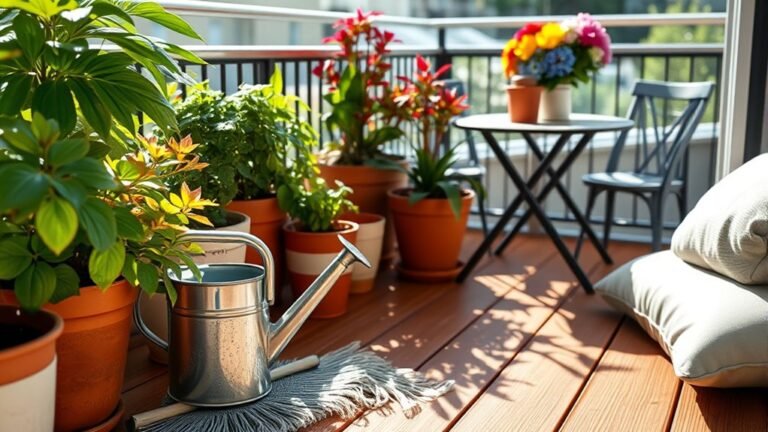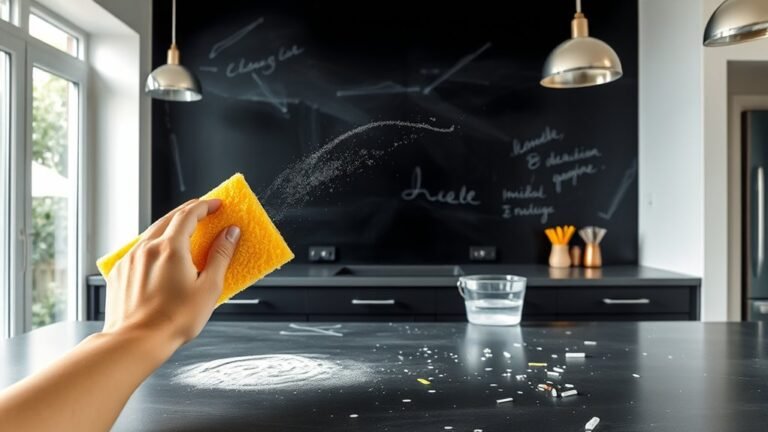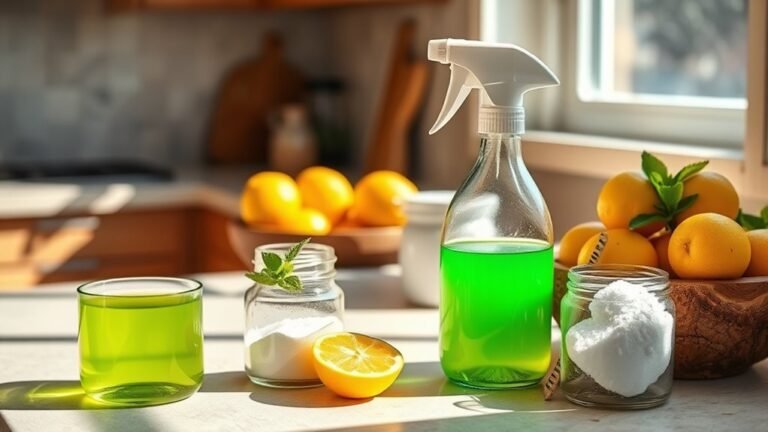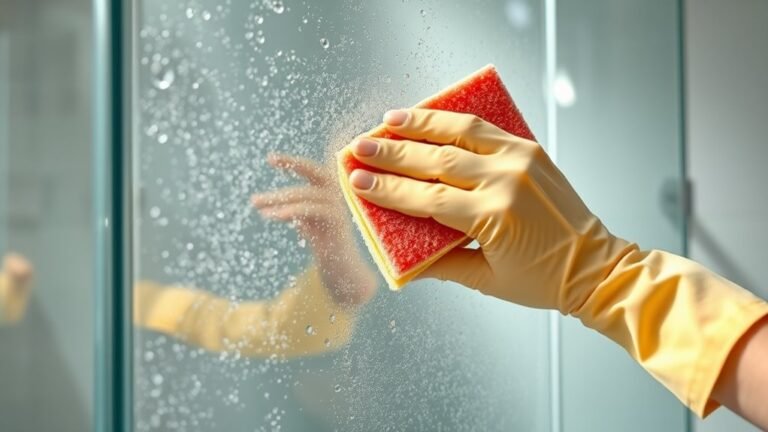Natural Cleaning Hacks for Your Kitchen
You can easily freshen up your kitchen using natural ingredients like baking soda to scrub tough stains, vinegar to disinfect surfaces, and lemon to cut through grease with its natural acids. Deodorize your fridge with baking soda or citrus, and clean wooden boards safely using vinegar and lemon. For tough oven racks, soak them in baking soda and vinegar mix. Try homemade all-purpose cleaners with essential oils for a healthy, eco-friendly kitchen—there’s plenty more simple, effective tips to discover.
Using Baking Soda to Remove Tough Stains
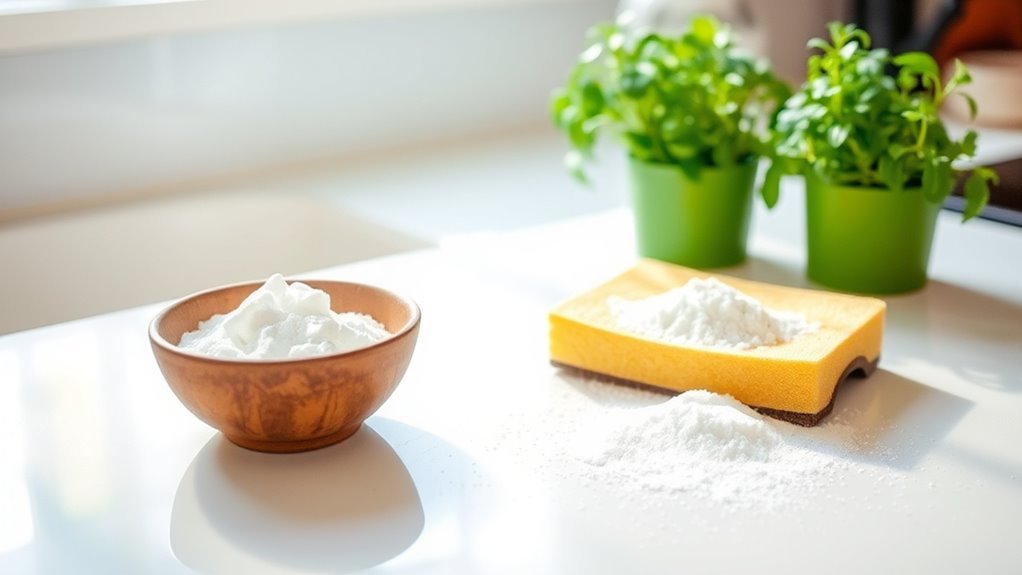
Although tough stains can be frustrating, using baking soda offers a simple and effective solution. You don’t have to rely on harsh chemicals to tackle those stubborn marks. Just sprinkle baking soda directly onto the stain, add a little water to make a paste, and gently scrub. The mild abrasiveness of baking soda helps lift the stain without damaging surfaces. Plus, it’s safe, natural, and affordable—perfect for anyone craving freedom from complicated cleaning routines. Whether it’s on countertops, sinks, or even fabric, baking soda works wonders on tough stains. You’ll appreciate how easy it is to reclaim your space without compromising your values or health. Embrace this natural hack and enjoy a cleaner, fresher environment with minimal effort.
How Vinegar Can Disinfect Your Surfaces
When you want to keep your surfaces clean without harsh chemicals, vinegar is a powerful disinfectant you can count on. Its natural acidity makes it incredibly effective at killing germs and bacteria, giving you a safe way to maintain a healthy kitchen. One of the biggest vinegar benefits is its versatility—you can use it on countertops, cutting boards, and even appliances to disinfect surfaces quickly. Simply mix equal parts water and white vinegar in a spray bottle, spritz on your surfaces, and wipe down with a clean cloth. This method not only tackles germs but also helps remove odors and grime. By choosing vinegar for disinfecting surfaces, you’re embracing a natural, free-spirited approach to cleanliness that’s safe for you and the planet.
Lemon’s Role in Cutting Through Grease
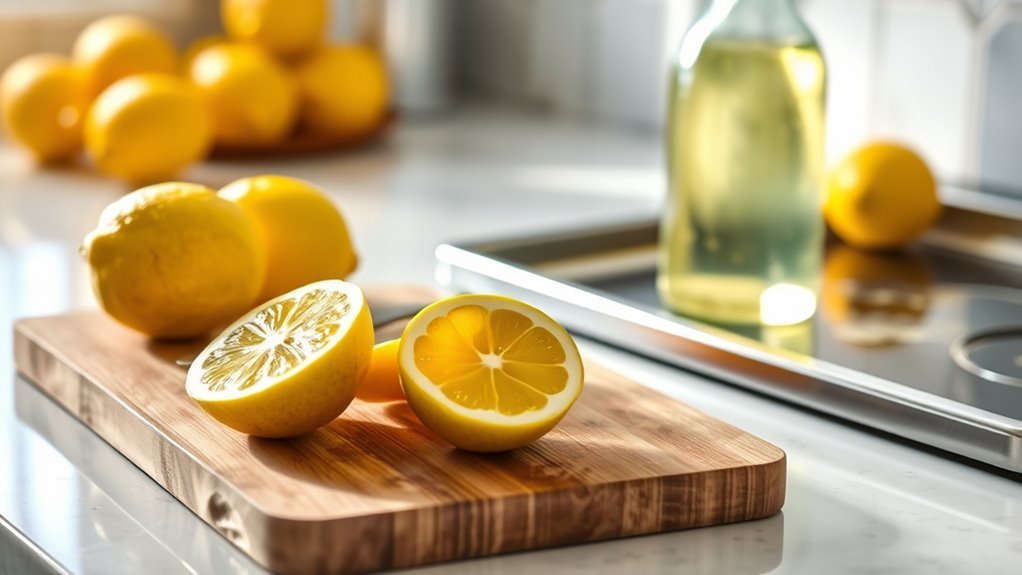
Since lemon contains natural acids, it’s a go-to solution for cutting through tough grease in your kitchen. You don’t have to rely on harsh chemicals when lemon juice acts as a powerful grease cutter, breaking down stubborn oily residues with ease. Embrace this natural freedom to clean effectively and safely. Here’s why lemon juice is your kitchen’s best friend:
- It effortlessly dissolves grease without toxic side effects.
- Leaves behind a fresh, uplifting scent that energizes your space.
- Is gentle on your skin, so you can clean without worry.
- Doesn’t harm your cookware, keeping everything pristine and shiny.
Using lemon juice lets you reclaim control over your cleaning routine while enjoying a naturally clean kitchen.
Natural Ways to Deodorize Your Refrigerator
Lemon’s natural ability to cut grease is just one way you can keep your kitchen fresh and clean. When it comes to natural ways to deodorize your refrigerator, you’ve got simple, effective fridge deodorizing techniques at your fingertips. Start by placing an open box of baking soda inside your fridge to absorb odors naturally. You can also use coffee grounds or activated charcoal as natural fragrance boosters—they trap smells without harsh chemicals. For a revitalizing twist, slice citrus fruits like lemon or orange and leave them on a plate in your fridge. This not only neutralizes odors but adds a subtle, clean scent. These easy methods let you take control of your kitchen’s freshness without relying on artificial sprays, giving you freedom to enjoy a naturally inviting space.
Cleaning Wooden Cutting Boards Safely
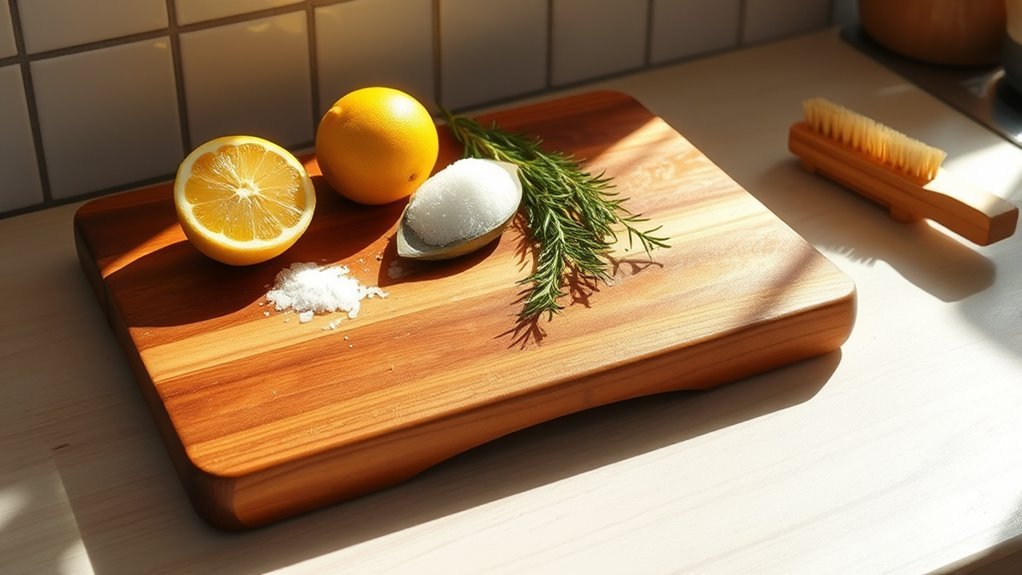
You’ll want to keep your wooden cutting board free from bacteria by cleaning it with natural ingredients like vinegar and lemon. After scrubbing, make sure you dry it thoroughly to prevent moisture buildup. These simple steps help keep your board safe and long-lasting.
Preventing Bacterial Growth
Although wooden cutting boards add a warm touch to your kitchen, they require careful cleaning to prevent bacterial growth. You want to enjoy freedom in your cooking without worrying about bacterial hotspots lurking on your board. Keeping a smart cleaning frequency is key to staying safe and confident.
Here’s how to protect yourself and your loved ones:
- Wash boards immediately after use with hot, soapy water
- Avoid soaking to prevent wood damage and bacteria buildup
- Dry boards thoroughly to stop moisture-friendly bacteria
- Regularly treat with mineral oil to seal cracks where bacteria hide
Natural Cleaning Ingredients
When cleaning wooden cutting boards, choosing natural ingredients helps you avoid harsh chemicals while effectively killing bacteria. You can rely on simple, safe elements like coconut oil and essential oils to keep your boards fresh and protected. Coconut oil moisturizes and prevents cracking, while essential oils such as tea tree or lemon provide antibacterial power and a pleasant scent.
| Ingredient | Benefit | Usage Tip |
|---|---|---|
| Coconut Oil | Moisturizes wood | Rub in after cleaning |
| Lemon Essential Oil | Antibacterial & deodorizer | Add few drops to scrub solution |
| Tea Tree Oil | Natural disinfectant | Mix with water for spray |
Embracing these natural ingredients gives you freedom from toxins while maintaining a clean, safe kitchen environment.
Proper Drying Techniques
Proper drying is essential to keep your wooden cutting boards safe and in good shape. After washing, you don’t want moisture lingering around, as it can cause warping or mold. Instead, embrace the freedom of natural drying methods that respect your board’s integrity. Here’s how to do it right:
- Start with a quick towel drying to remove excess water without rubbing harshly.
- Stand your board upright or prop it on its edge to encourage air drying.
- Confirm it’s in a well-ventilated area, letting fresh air do its magic.
- Avoid stacking or covering the board until completely dry to prevent trapped moisture.
Refreshing Your Sink With Simple Ingredients
A few common household ingredients can quickly refresh your sink without harsh chemicals. Start by sprinkling baking soda all over the surface—this gentle abrasive is perfect for effective sink scrubbing techniques. Add a splash of white vinegar to create a fizzing reaction that helps lift grime effortlessly. After scrubbing with a soft brush or sponge, rinse thoroughly with warm water. To give your sink a natural sink polish, rub a small amount of olive oil or coconut oil onto the surface using a soft cloth. This not only restores shine but also creates a protective layer against future stains. With these simple steps, you’ll enjoy a cleaner, brighter sink while embracing freedom from toxic cleaners and complicated routines.
Removing Hard Water Deposits Naturally
Hard water deposits can build up from minerals in your water, leaving stubborn stains around your home. You can easily tackle these with vinegar, a natural cleaner that breaks down those deposits without harsh chemicals. Plus, a few simple habits can help you prevent buildup before it starts.
Causes of Hard Water
Although you might not realize it, the water flowing from your tap can contain minerals like calcium and magnesium that cause deposits to build up over time. This is what creates hard water, a common issue that leads to stubborn mineral buildup on your kitchen surfaces. Understanding the causes helps you take control and free yourself from its effects. Hard water forms when:
- Water passes through mineral-rich soils or rocks
- Dissolved calcium and magnesium accumulate
- Water evaporates, leaving minerals behind
- Pipes and appliances trap these minerals, causing buildup
Knowing this empowers you to tackle hard water naturally, keeping your kitchen clean and your freedom intact. Don’t let hard water dictate your cleaning routine—understand its roots and reclaim your space.
Vinegar Cleaning Technique
One of the simplest and most effective ways to remove mineral buildup is vinegar. Its natural acidity breaks down hard water deposits effortlessly, saving you from harsh chemicals. You’ll appreciate vinegar benefits like affordability, eco-friendliness, and versatility in your cleaning routine. Just soak a cloth in white vinegar, apply it to the affected area, and let it sit for 15–30 minutes before wiping away the residue. If vinegar’s scent isn’t your favorite, there are vinegar alternatives such as lemon juice or diluted citric acid that work similarly well. Both options offer you freedom from toxic cleaners while keeping your kitchen sparkling. Embracing these natural solutions lets you maintain a fresh, clean space without sacrificing your health or the planet.
Preventive Maintenance Tips
After using vinegar or its natural alternatives to tackle mineral buildup, you’ll want to keep deposits from coming back. Embracing simple preventive maintenance helps you enjoy a freer, cleaner kitchen without constant scrubbing. Focus on these habits to protect your appliances and boost kitchen organization:
- Wipe down faucets and sinks daily to prevent hard water spots from settling.
- Use a water softener or install a filter to reduce mineral content naturally.
- Dry surfaces immediately after use to stop deposits before they form.
- Regularly descale appliances like kettles and coffee makers with natural solutions.
Eco-Friendly Methods for Cleaning Oven Racks
When you’re tackling oven racks, you don’t have to rely on harsh chemicals to get them clean. Instead, embrace natural scrubbing with simple, eco-friendly solutions that free you from toxic fumes. Start by soaking the racks in a bathtub or large basin filled with hot water and a mix of baking soda and white vinegar. This combo loosens grime without damaging the metal. After soaking for a few hours, grab a sturdy brush or steel wool and gently scrub away the remaining residue. These natural methods save you from harsh chemicals and give you peace of mind knowing your kitchen stays safe and clean. You’ll appreciate how easy and effective eco-friendly solutions can be—helping you keep your oven racks sparkling without compromising your freedom or health.
Homemade All-Purpose Kitchen Cleaner Recipes
Cleaning oven racks naturally sets a great tone for tackling other kitchen surfaces without harsh chemicals. When you whip up homemade cleaners, you reclaim control over what touches your home. Essential oils not only boost cleaning power but bring fresh, uplifting scents that transform chores into moments of joy. Here are some simple all-purpose kitchen cleaner recipes you can try:
- Mix equal parts water and white vinegar with a few drops of lemon essential oil for a streak-free shine.
- Combine baking soda, castile soap, and tea tree essential oil to fight grease and bacteria.
- Blend water, rubbing alcohol, and lavender essential oil for a quick disinfectant spray.
- Use a citrus peel-infused vinegar solution for a natural degreaser with a zesty aroma.
These recipes empower you to clean freely, without compromise.
Frequently Asked Questions
Can Natural Cleaners Harm My Kitchen Appliances?
You might wonder if natural cleaner safety could be a concern for your kitchen appliances. Generally, natural cleaners are gentler and won’t damage surfaces, helping maintain your appliance longevity. However, it’s smart to avoid acidic or abrasive ingredients on sensitive parts. By choosing the right natural products, you’ll enjoy a safe, effective clean without risking wear or harm—giving you freedom to keep your kitchen sparkling without worry.
How Often Should I Deep Clean My Kitchen Naturally?
You’ll want to give your kitchen a “refreshing reset” about once a month. Sticking to a deep cleaning frequency like this keeps things feeling free and clear, letting you enjoy your space without the hassle of buildup. Pair this with a kitchen cleaning schedule that includes lighter daily tidying, and you’ll maintain a breezy, inviting environment. It’s all about balancing thorough care without feeling chained to chores.
Are Natural Cleaning Products Safe for Pets?
You’ll be glad to know that many natural cleaner products use pet safe ingredients like vinegar, baking soda, and essential oils in low concentrations, making them less toxic around your furry friends. While natural cleaner effectiveness can sometimes be gentler compared to harsh chemicals, they still work well for everyday messes. Just make sure to double-check ingredient lists and avoid anything toxic to pets, so you can clean freely without worry.
Can Essential Oils Be Used in Kitchen Cleaning?
Yes, you can definitely use essential oils in your kitchen cleaning. They offer essential oil benefits like natural antibacterial and antifungal properties, making your space fresher without harsh chemicals. You can mix oils like lemon or tea tree into your cleaning recipes for a powerful, pleasant scent and added germ-fighting power. Just remember to dilute them properly and keep them away from pets or open flames. It’s a simple way to clean freely and naturally!
How Do I Store Homemade Natural Cleaners Safely?
When storing homemade natural cleaners, you’ll want to use sturdy storage containers that won’t leak or react with the ingredients. Always practice bottle labeling to avoid confusion and keep things safe, especially if you mix multiple solutions. Choose dark glass bottles to protect your cleaners from sunlight, prolonging their effectiveness. Keep them out of reach of kids and pets, and store them in a cool, dry place where you have easy access but still maintain safety.
